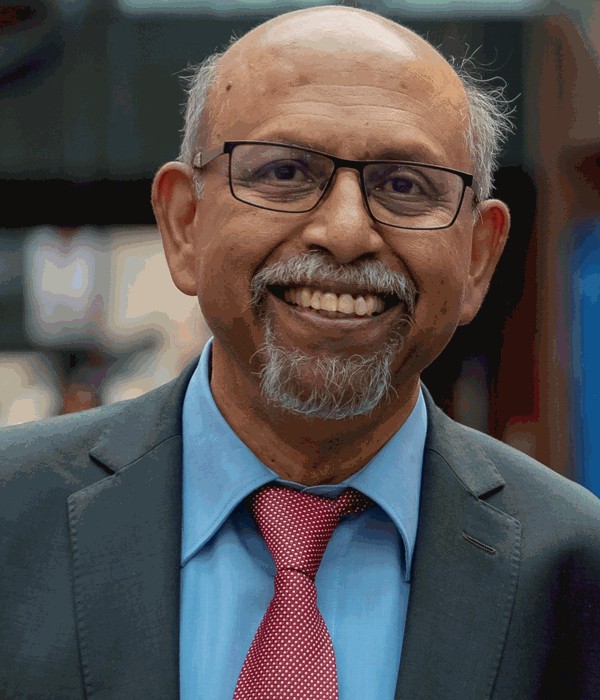
Leo Prakash, a renowned authority in the field of powder metallurgy and hard materials, unexpectedly died aged 69 on 16 February 2019 in Rottenburg am Neckar, Germany.
Leo Prakash was born in Madras, India on 25 May 1949. He attended St. Bede's High School and Loyola College before studying for his Bachelor of Technology degree in Metallurgy at the Indian Institute of Technology in Madras. After graduating in 1970 he moved to Germany and worked for 2 years as an industrial trainee learning many aspects of practical metallurgy. He soon returned to academia, completing his Masters degree (Diplom-Ingenieur) in Mechanical Engineering at the Technical University of Karlsruhe in 1975. For the next 4 years at the Institute for Materials Research and Solid State Physics at the Nuclear Research Center in Karlsruhe, he worked as a postgraduate research associate where he obtained his Ph.D. (Dr-Ing.) on cemented carbides with iron-based binders. He stayed there for another 3 years as a post-doctoral research scientist performing governmental and industrial contract research, developing, manufacturing and characterising novel new cemented carbides and hard coatings.
In 1982, he started his long and illustrious career in the hardmetal industry at Ledermann GmbH in Horb am Neckar, which in 1991 became United Hardmetal GmbH in a joint venture with Cerametal S.a.r.L of Luxembourg. Over his 14 years at the company he worked his way up from Metallurgist to R&D and Production Manager then finally Director of Materials Engineering before leaving at the end of 1993 to form PM PulverMetall GmbH, his own start-up company manufacturing innovative wear parts and other powder metallurgical (PM) components. Between 1997 and 1998 he was the Technical Director for Metal Injection Moulding (MIM) at Hock Sachsen GmbH, then Technical Director at Tigra Hartstoff GmbH into 2000. Then, after spending 8 years concentrating entirely on his numerous activities as an international Management and Technology Consultant with his WTP Materials Engineering Consultancy, he returned to industry in a specialist role at Unimerco GmbH (later Kyocera) between 2008 and 2016.
During almost 25 years of consulting he supported numerous companies in the development, design, manufacturing and marketing of MIM, PM and cemented carbide hardmetal (HM) parts in Europe (Austria, Denmark, Germany, Italy, The Netherlands, Poland, Portugal and Switzerland), Asia (China, South Korea and Taiwan), India, South Africa and U.S.A. He remained active within the industry in this role until the very end.
In the development of cemented carbides, Leo is best known for his pioneering work in the late 1970's and early 1980's on iron-based binders for hardmetals. This led to the commercialisation of several alternatives to pure cobalt and laid the foundation for the wave of recent research and development into low-cobalt and cobalt-free hardmetals, an important topic considering the status of cobalt as a critical raw material as well as the current strict classification issues. Following on, from the mid-late 1980s and into the 1990s, his fundamental studies into the mechanisms of grain growth inhibition and sintering of the very finest grained tungsten carbide hardmetals at the time were also of great significance for the industry, as were his studies of material properties and performance in both laboratory tests and practical applications. He authored or co-authored over 40 publications in international journals, conferences and textbooks, and many are still regularly cited today.
Leo Prakash was also particularly gifted in bringing people together. He was central to fostering a true hard materials community within Europe and was an iconic and highly respected figure within the field. He was an active member of numerous material societies and working groups within Germany, the U.K. and U.S.A., including national and international bodies. Later, he became best known as a driving force within the European Powder Metallurgy Association (EPMA). He was the Co-Chairman of the European Hard Materials Group (EuroHM, formerly EHMG) for over 10 years. In this role, he initiated and originated a series of ‘Club Projects’, bringing together RTO's and industrial companies from across Europe to perform pre-competitive basic research on a range of topics related to cemented carbides. This collaborative model has since been adopted by other sectoral groups within the EPMA and has proven to be one of the success stories of recent years for the EPMA.
At EuroPM and WorldPM conferences, his hard work behind the scenes helped shape the scientific content of Technical Sessions and he personally organised several Special Interest Seminars at those events. The EPMA hardmetal training course in Vienna in 2014 was an acknowledged success due largely to his efforts in bringing together a world-class programme, and training new generations of scientists and engineers in the field of hard materials was always a priority of his. His most recent and highly influential contribution was the ‘Vision2025’ EPMA roadmap document for hard materials. This document defines the future strategy and R&D focus of the European hard materials community and how it should address the major challenges of low-cost competition from outside Europe and potential raw material supply chain disruption.
Leo's funeral took place on 1 March in Rottenburg am Neckar. He is survived by his wife Lydia, his four children (Rebecca, Deborah, Sarah and David) and four grandchildren.
In summary, Dr Leo Prakash was a renowned authority in the field of cemented carbides and other hard materials. A modest man, he often understated his wealth of knowledge on the subject which is widely acknowledged within both academic and industrial circles. A warm and gentle man with a strong spirit and fine sense of humour, he will be sorely missed. For those who knew him well, it is his contagious smile that shall be missed the most. The hardmetal community has lost a giant and a friend but his legacy and memory will live on.
